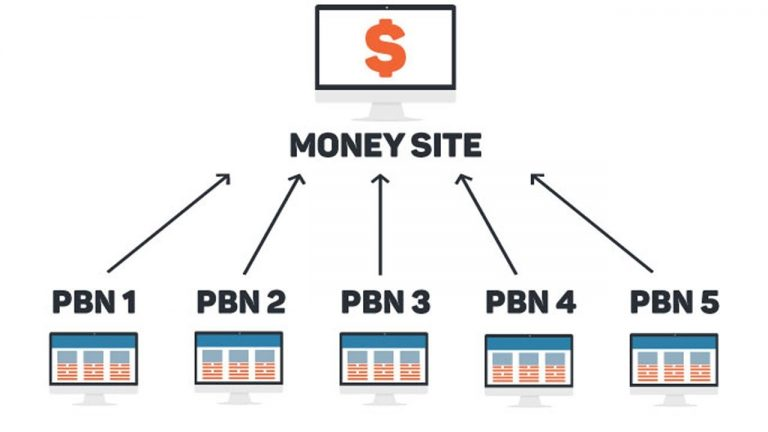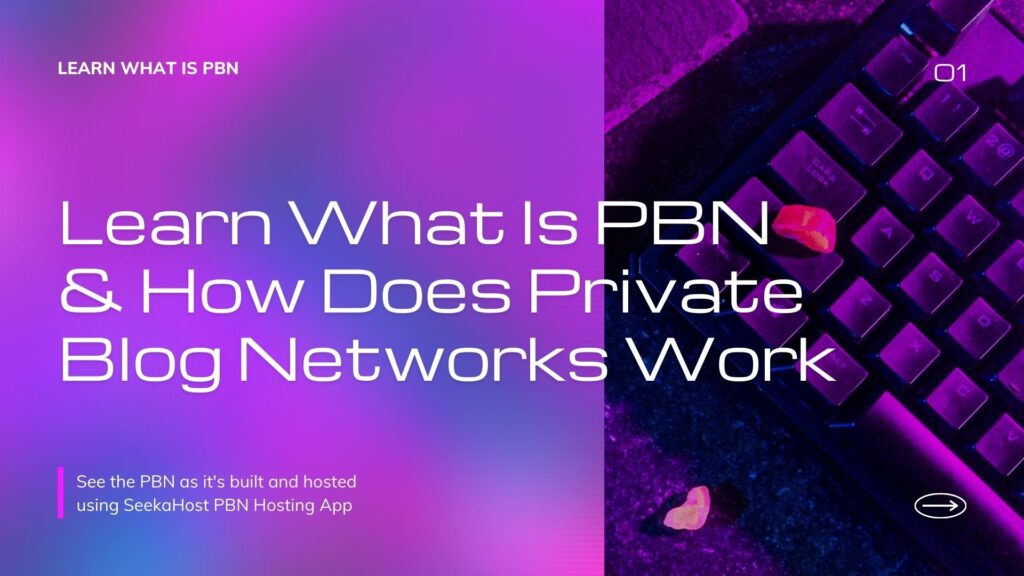Unlock the secrets of PBN in SEO: Learn everything you need to know about Private Blog Networks and their impact.

Image courtesy of via DALL-E 3
Table of Contents
Introduction to PBN in SEO
In this section, we will explore the world of SEO and delve into the significance of Private Blog Networks (PBNs). Let’s unravel the mystery behind PBNs and understand how they play a crucial role in boosting website rankings.
What is SEO?
If you’ve ever wondered how websites appear at the top of search results when you type in a query on Google, then you’ve touched upon the realm of Search Engine Optimization, or SEO. In simple terms, SEO involves strategies and techniques that help websites rank higher on search engines like Google. The higher a website ranks, the more likely it is to be seen by people searching for relevant information.
Introduction to PBN
Now, let’s introduce you to the concept of a Private Blog Network (PBN). A PBN is a network of websites that are interlinked and are used to create backlinks to a target website. These interconnected websites are usually owned by the same person or entity. The primary purpose of a PBN is to improve the search engine rankings of the target website by building a web of backlinks that signal authority and trustworthiness to search engines like Google.
How PBNs Work
Backlinks are like street signs on the internet that direct people from one website to another. When a website links to another, it’s like giving a vote of confidence to that site. These links are crucial in SEO because search engines see them as a sign of a website’s popularity and credibility.
Building a PBN
Creating a Private Blog Network involves a few key steps. First, people buy expired domains that already have some trust and authority from search engines. Then, they set up websites on these domains and create content that includes links to the main website they want to boost. By interlinking these websites within the network, they can pass on authority to the main site and improve its rankings.
Why People Use PBNs
One of the primary reasons why website owners use Private Blog Networks (PBNs) is to boost their website’s rankings on search engine results pages. By strategically placing backlinks on the network’s websites, they can improve their site’s authority and relevance in the eyes of search engines like Google.

Image courtesy of www.fernandoraymond.com via Google Images
Driving Traffic
Another key benefit of utilizing a PBN is the ability to drive more traffic to a website. As search engines recognize the increased authority of a site due to the backlinks from the network, they are more likely to rank the site higher. This, in turn, leads to more visibility and clicks from interested users.
Increasing Visibility
By improving search engine rankings and driving more traffic to a website, PBNs ultimately help increase its visibility online. Being more visible in search engine results means that more potential visitors will discover the website, resulting in a broader audience reach and potential for growth.
Risks and Downsides of PBNs
One of the biggest risks associated with using Private Blog Networks (PBNs) is the possibility of incurring penalties from search engines like Google. When search engines detect that websites are artificially manipulating their rankings through PBNs, they can penalize those sites by lowering their positions in search results or even removing them entirely. This can have a significant negative impact on the visibility and traffic of a website.
Getting Banned
Another serious downside of using PBNs is the risk of getting a website banned from search engine results altogether. If search engines determine that a website is engaging in shady practices like using PBNs to manipulate rankings, they can ban the site entirely. Being banned means that the website will no longer appear in search results, leading to a drastic decrease in organic traffic and online visibility.
Alternatives to PBNs
When it comes to improving your website’s SEO, there are ethical and search engine-approved methods that are considered safe alternatives to using PBNs. White-hat SEO techniques involve following guidelines set by search engines to optimize your site without resorting to risky tactics like private blog networks.

Image courtesy of www.clickintelligence.co.uk via Google Images
Building Natural Links
One effective way to boost your website’s authority and ranking without relying on PBNs is by building natural links. Natural links are backlinks that are earned organically through high-quality content and genuine engagement with other websites. By creating valuable and shareable content, you can attract natural backlinks from reputable sources, which can significantly improve your SEO.
Content Marketing
Content marketing is another powerful alternative to PBNs that focuses on creating and distributing valuable, relevant, and consistent content to attract and retain a clearly defined audience. By producing high-quality content that resonates with your target audience, you can drive more traffic to your website, increase engagement, and ultimately improve your search engine rankings. Content marketing not only helps with SEO but also enhances your brand’s reputation and credibility in the long run.
**Please note: Make sure to implement these alternatives to PBNs to safeguard your website from potential penalties and risks associated with using private blog networks. By focusing on white-hat SEO techniques, building natural links, and investing in content marketing, you can achieve sustainable and long-term success in improving your website’s SEO performance.**
Case Studies and Examples
In one notable case study, a small business owner created a Private Blog Network to improve the visibility of their online store that sold handmade jewelry. By strategically linking their main website to several high-quality blogs within their PBN, they saw a significant increase in their website traffic and search engine rankings. This resulted in a boost in sales and overall business success.
Failed PBN Case
Conversely, a website owner attempted to artificially inflate their website’s authority by using a PBN that consisted of low-quality and irrelevant blogs. This led to a severe penalty from search engines, causing their website to be banned from search results entirely. The unethical practices associated with the PBN not only damaged their online reputation but also resulted in a substantial loss of traffic and revenue.
Legal and Ethical Considerations
When it comes to using Private Blog Networks (PBNs) in SEO, there are important legal and ethical considerations that website owners and SEO professionals should keep in mind. Let’s delve into some of the key aspects of using PBNs responsibly.

Image courtesy of contentmarketinginstitute.com via Google Images
Ethical Questions
One of the primary ethical questions surrounding the use of PBNs is whether it aligns with the principles of ethical SEO practices. While PBNs can potentially boost website rankings and visibility, they often do so by manipulating search engine algorithms rather than providing genuine value to users. This raises concerns about fairness and integrity in the SEO landscape.
Legal Issues
From a legal standpoint, using PBNs can also pose risks. Some search engines, like Google, have strict guidelines against manipulative link schemes, including the use of PBNs. Violating these guidelines can result in penalties such as a drop in rankings or even getting banned from search engine results altogether. It’s crucial for website owners to be aware of these potential legal ramifications before deciding to incorporate PBNs into their SEO strategy.
Future of PBNs in SEO
As search engines like Google continue to refine their algorithms, the future of Private Blog Networks (PBNs) in SEO remains uncertain. These algorithms are becoming increasingly sophisticated in detecting artificial link schemes like PBNs. Website owners need to stay vigilant and adapt to these changes to avoid penalties.
Emerging Practices
With the growing challenges of using PBNs, emerging SEO practices are gaining momentum. Techniques such as creating high-quality, relevant content, building natural backlinks, and engaging in white-hat SEO strategies are becoming more popular. These practices focus on providing value to users and aligning with search engine guidelines, steering away from the risks associated with PBNs.
FAQs
A PBN, or Private Blog Network, is a group of websites that are used to create backlinks to a main website to improve its search engine rankings. These websites are typically owned by the same person or entity.

Image courtesy of www.fernandoraymond.com via Google Images
Why are PBNs risky?
PBNs can be risky because search engines like Google have strict guidelines against manipulating search results through artificial means like PBNs. If search engines detect a PBN, the main website and all associated websites could face penalties, including being banned from search results.
What can I use instead of a PBN?
Instead of using PBNs, you can opt for White-Hat SEO techniques, such as creating high-quality content, building natural backlinks, and following ethical SEO practices. These methods may take longer to show results, but they are safer and more sustainable in the long run.
Conclusion
In conclusion, Private Blog Networks (PBNs) play a significant role in Search Engine Optimization (SEO) strategies for many website owners. These networks serve as a way to boost website rankings, increase traffic, and improve visibility on search engine results pages. By strategically using backlinks, PBNs can enhance a website’s authority and trustworthiness in the eyes of search engines.
Recap of PBNs
Private Blog Networks, or PBNs, are groups of websites interconnected through backlinks that aim to enhance a website’s SEO performance. By creating a network of websites with relevant content and links, website owners can improve their rankings on search engine results pages.
Final Thoughts on SEO
When utilizing PBNs in SEO strategies, it is crucial to consider ethical practices and adhere to search engine guidelines. While PBNs can yield positive results, they also come with risks such as penalties and bans from search engines. As search engine algorithms evolve, website owners must be prepared to adapt and explore alternative SEO techniques like white-hat methods and content marketing.
Overall, understanding the basics of PBNs in SEO can provide website owners with valuable insights into how to improve their online presence and attract more visitors. By staying informed about the risks and benefits associated with PBNs, website owners can make informed decisions about the best strategies to enhance their website’s visibility and performance.







